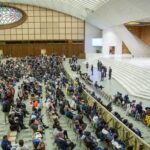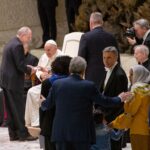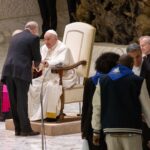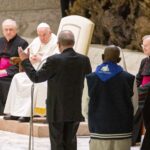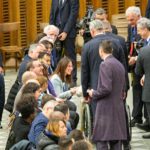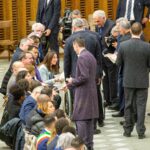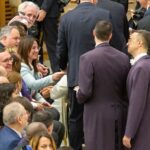Roma (NEV), 19th March 2023 – [article translated by Fiona Kendall, photo @Pietro Romeo, @Riforma]
Waldensian pastor Daniele Garrone, President of the Federation of Protestant Churches in Italy (“FCEI”), spoke today at the meeting with the Pontiff in the Aula Nervi in the Vatican: “Let us continue to do our part for those who are still mourning”.
By Barbara Battaglia -18th March 2023
Rome (NEV), 18th March 2023 – The Cutro shipwreck “did not have to happen, and everything possible must be done to ensure it does not happen again. Humanitarian corridors build bridges that so many children, women, men and elderly people, coming from serious danger and very precarious situations, have travelled in safety, legality and dignity to their host countries. They cross borders and, still more, the walls of indifference on which the hope of so many people, who wait for years in painful and unbearable situations, is often shattered “. So said Pope Francis a few hours ago, during the audience this morning at which he met refugees who have arrived in Italy and Europe thanks to humanitarian corridors established in 2016 by FCEI; the Waldensian Board with the contribution of the Waldensian Otto Per Mille tax allocation scheme and the Waldensian Diaconate, which takes responsibility for hosting people in diverse locations; the Community of Sant’Egidio; and civil society bodies such as Caritas and Arci. The Aula Nervi in the Vatican was packed with around 5,000 people from 11.00am today, Saturday 18th March, for the Pontiff’s audience.
In his remarks regarding the humanitarian corridor system, Waldensian pastor Daniele Garrone, FCEI President, emphasised: “This is not the naive charitable impulse of pious or virtuous souls, moved by unrealistic sentimentalism. We think it one of the reasonable responses, which states should also adopt, to a problem which also calls into question the quality of those constitutional democracies based on the protection of human rights, our continent having arrived at this point with its own tragedies mirroring those which force men and and women to flee today, leaving because they have no option other than to succumb. “Europe, too, has been bloodstained by wars,” recalled the FCEI president, “including religious wars, intolerance and dictatorships, Europe, too, has had millions and millions of migrants in search of a better future. If we looked at our past, even the recent past, perhaps the meaning of another word from the Bible would become clear to us: ‘You know the soul of the immigrant’. Today, he concluded, ‘we rejoice with you; for the rest, we continue to do our part for those who are still mourning’.
Also speaking at the Vatican event was Daniela Pompei, head of the Community of Sant’Egidio’s services for immigrants, who promoted today’s initiative, recalling how the humanitarian corridors were “born out of the painful memory of the deaths at sea, born out of weeping and prayer. Prayer and pain helped us not to resign ourselves but to reflect, and to fight to build an alternative route to the boats. Prayer and pain have pushed us, forced us almost, to that creativity in love of which you, Holy Father, so often spoke. From 2016 to date, 6,080 lives have been saved, arriving in Europe legally, arriving mainly in Italy, but then in France, Belgium and a limited number in the principality of Andorra and San Marino. A small light in the face of the wall of impossibility and the idea that nothing can be done’.
HERE is the full speech by the president of the evangelical churches, Daniele Garrone:
“Your Holiness, dear brother in Christ, dear friends, our Scripture says: ‘Rejoice with those who rejoice; mourn with those who mourn’ (Romans 12:15 NIV 2008).
Today the dominant note, in seeing so many of you here, is one of joy and gratitude. We know what you have suffered and what you have had to leave behind to get here, and we hope and wish that you will find a protected, indeed a blessed, life here.
There is another reason for joy and gratitude: if we have done anything to bring you here, we have done it as Christians of different denominations. It is the ecumenical dimension of humanitarian corridors that we always rediscover: we are all reached by the same Word of God, which gives us hope and calls us to the service of our neighbour. A common hope, a common vocation, which I would like to express today in the words of the prophet Micah: “Man, you have been taught what is good and what the Lord requires of you: to practise justice, to love goodness, to walk humbly with your God. “(Micah 6,8 CEI 2008)
Today’s joy and gratitude are not overshadowed by the second part of the invitation: ‘weep with those who mourn’ but it, too, resonates. We all have in our hearts the latest tragic shipwreck of those who have no other recourse but a risky, in some ways insane, crossing. Those of us who are in Lampedusa, in our Migration Observatory, welcoming those who have made it, bear witness to the dramatic stories each person carries within them and often on their bodies. Participating in mourning must move us ‘to practice justice’; this is the call we feel is addressed to us. Humanitarian corridors are one way of trying to respond to this call.
We believe that this is one of the reasonable responses to a problem in which the quality of those constitutional democracies based on the protection of human rights is also at stake. Our continent has arrived at this point having suffered tragedies similar to those which force men and and women to flee today, leaving because they have no option other than to succumb: Europe too has been bloodied by wars, even ‘religious’ wars, by intolerance and dictatorships, Europe too has had millions upon millions of migrants in search of a better future. If we looked at our past, even the recent past, perhaps the meaning of another another word from the Bible would become clear: ‘you know the soul of the immigrant’ (Exodus 23:9).
Today we rejoice with you; for the rest, we continue to do our part for those who are still mourning”.






















